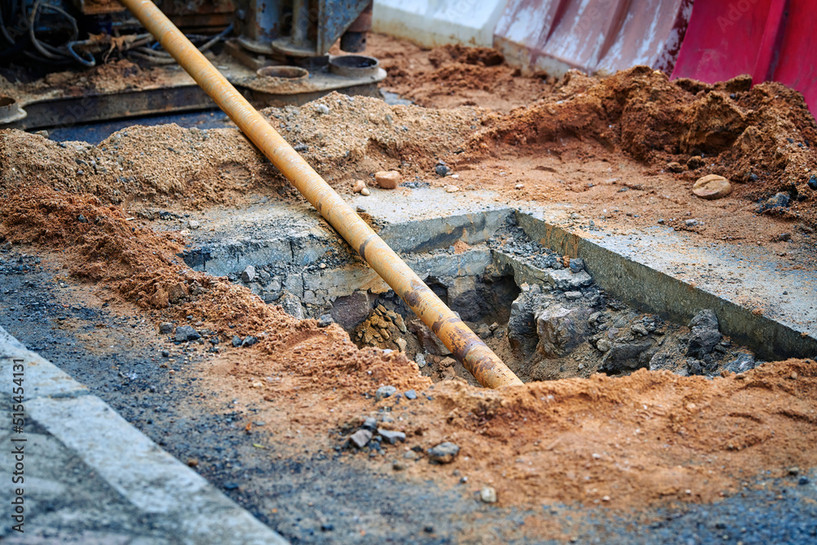Modern equipment and technology have greatly improved the safety and efficiency of underground utility work. Still, there’s no substitute for careful planning, effective communication, well-trained crews, and a strong commitment to jobsite safety. Below is a breakdown of key safety steps for contractors installing or servicing underground utilities.
Locate with Confidence
The first rule before breaking ground is to call 811. While 811 is a national "Call Before You Dig" program managed by the Common Ground Alliance, each state has its own rules and procedures. So, the real first step is knowing the specific requirements where you’ll be working.
An important companion to 811 is white lining—marking the intended bore path on the jobsite. This helps utility owners know what areas need to be located and exposed (also known as "daylighted").
Once utilities are marked, contractors should always verify those locates. A high-quality, multi-frequency locating system—offering transmission frequencies from 253 Hz to 200 kHz—can enhance accuracy. For non-metallic lines like plastic water pipes, locate beacons are also helpful.
Find the Jameson Cable & Pipe Precision Locating Receiver here: Cable and Pipe Signal Receiver at Georgia Underground
Contractors must also be aware of private utilities, which aren’t covered by 811. These can include gas, water, sewer, irrigation, internet, and phone lines. OSHA regulations require locating all reasonably expected underground utilities, regardless of ownership. Physically exposing those lines—even when using highly accurate locators—remains a best practice.
Pre-Dig Planning
Beyond utility locating, jobsite excavation safety requires understanding several factors, including the depth of the planned dig. OSHA standards often apply when digging more than a few feet deep, which could require sloping, benching, shoring, or engineered shielding systems to prevent cave-ins.
Ground contamination is another potential hazard. Signs include dead grass, erosion, unusual smells, and the absence of vegetation or wildlife. Contractors can consult local and state agencies or search EPA databases for property-specific environmental concerns.
As excavation day approaches, contractors should also focus on creating a safe, organized, and well-prepared jobsite.
Equipment Guidance
Contractors have a wide range of excavation tools available, from mini-excavators and backhoes to specialized trenchers and Horizontal Directional Drills (HDD). Regardless of the machine, operators must know how to use the equipment safely—and understand its limitations.
HDD Safety Tips:
Once the drill surfaces, drill lockout mechanisms must be tested to prevent unintentional movement. Also, contractors should watch for inadvertent fluid returns, which can result from too much downhole pressure and create safety and environmental issues like flooding streets or yards. Monitoring fluid pressure and ground conditions closely is essential.
Trencher Safety Tips:
Safe operation starts with selecting the right machine for the job—factors like soil type, slope, and material hardness all matter. Working with your local dealer can help ensure you’re matched with the right equipment.
Operators must also be familiar with the equipment manual, which contains crucial safety procedures. For example, if someone gets within 6 feet of an operating trencher, the digging chain should be stopped immediately to prevent injury.
Final Thoughts
Locating is where safe excavation begins—and ends. Using advanced equipment like centimeter-level utility locators with mapping capabilities not only ensures safer work but also allows contractors to leave behind accurate documentation. This helps the property owner or future crews know the precise location of new and existing utilities.
As the number of underground utilities continues to grow, having detailed, accurate information is more valuable than ever.
Georgia Underground Superstore is your trusted partner in underground utility installation. With a deep inventory of locating tools, HDD equipment, safety gear, and trenching accessories, GUS is dedicated to supporting utility contractors across the U.S. Our knowledgeable staff, commitment to stocking top brands, and fast nationwide shipping ensure you get the right tools when you need them. Whether you're tackling a major utility install or need support in the field, Georgia Underground Superstore is here to help you dig smarter and safer.
Find HDD Equipment & Supplies here: HDD/Horizontal Directional Drilling Products for Utilities

